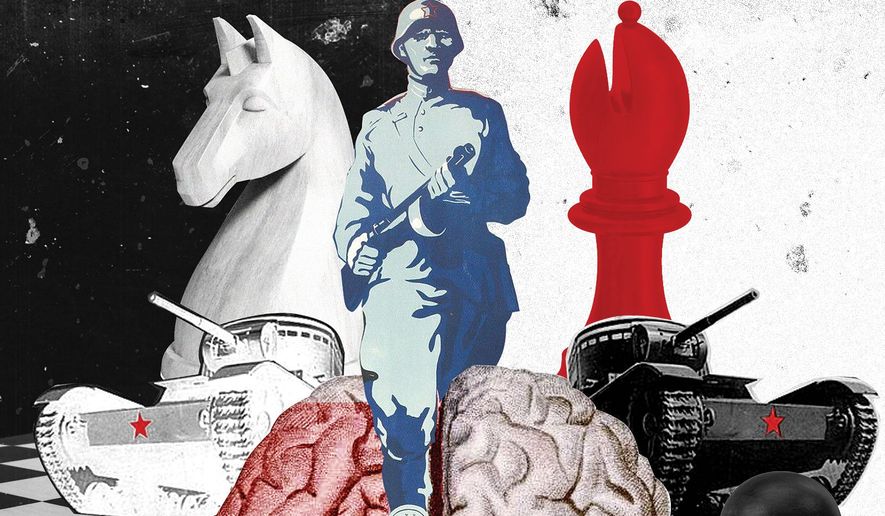OPINION:
On Jan. 23, at the World Holocaust Forum in Yad Vashem, Jerusalem, a ceremony was held to commemorate the 75th anniversary of the liberation of the Auschwitz-Birkenau death camp. For most, it was a moment of solemn reflection, for others it was politics as usual.
Momentous historical events are rarely free of a degree of politicization, but the Holocaust Forum took place at a time of particularly heightened sensitivities, thanks in large part to the ongoing efforts of Russian President Vladimir Putin to weaponize the memory of World War II.
Mr. Putin’s propaganda offensive — one might call it a “memory war” — has been ongoing for a few years, but came to prominence once again shortly before Christmas, when Mr. Putin devoted almost his entire hour-long speech at a summit to attacking Poland for its supposed collaboration with Hitler prior to the outbreak of the war in 1939.
It is often joked that one of the staples of Kremlin disinformation campaigns is to accuse others of the things you do yourself. Rarely, however, was the tactic more obviously in evidence.
Of course, it was Stalin’s USSR that collaborated with Hitler’s Germany for the opening 22 months of the war — from the odious Nazi-Soviet Pact of August 1939, to Hitler’s attack on his erstwhile partner, Operation Barbarossa, in June 1941 — entering a strategic and economic relationship that divided Central Europe between the two, snuffing out the independence of the Baltic States and Poland and unleashing World War II.
It would be foolish to suggest that Mr. Putin and his advisers in the Kremlin are ignorant of such basic facts about the chronology of the war, so one has to wonder why they are engaging in such a blatant attempt to rewrite history.
At the most obvious level, of course, one can see a simple distraction tactic behind such utterances. The difficulties currently being experienced by Mr. Putin’s Russia — the stagnant economy, the stalemate in Russia’s war in eastern Ukraine, the humiliation of the doping scandal — can be partly deflected by manufacturing a distraction for the Russian media and public.
In addition, one might argue that the growth in understanding outside Russia of the opening phase of the war; as demonstrated by the European Parliament resolution of Sept. 17 last year, which explicitly recognized the complicity of Stalin’s Soviet Union in the outbreak of hostilities, is also a driver. After all, the binary Russian narrative of the war can ill-afford an intrusion of complexity and nuance.
Yet, beyond all that, one must recognize that Russia’s “memory war” is part of a much wider effort to harness the popular resonance of World War II as a way of legitimating Mr. Putin’s rule, and underpinning Russia’s modern great power ambitions. World War II has become something like the foundation myth of Mr. Putin’s Russia.
It isn’t new, of course; indeed much of it is reheated Stalinist boilerplate. The Soviet Union long held to a curiously black and white view of World War II. The “Great Patriotic War” — as it was known — was a fight of good against evil, which began on June 22, 1941, and ended with the heroic Red Army liberation of Central and Eastern Europe from Nazi tyranny.
It was a narrative in which the people of the Soviet Union were only ever victims or victors; and the needs of the propaganda machine meant that there was no room for anything else.
But, as Central Europeans know only too well, Soviet participation in the war did not begin only in the summer of 1941. Though Stalin declared the Soviet Union neutral in 1939, his forces actively collaborated with those of Hitler’s Germany, not least in the invasion of Poland in September 1939, and he even congratulated the German dictator on his early victories.
It is these parts of the wartime narrative — where Soviet actions, far from glorious, are tainted by collaboration with fascism and aggression against its neighbors — that the modern Russian version of the war cannot tolerate. So, they are being rewritten: With the propagation of a spurious new narrative that the Soviet Union was entirely blameless, that it was Poland that collaborated with Hitler, and that the Nazi-Soviet Pact was an entirely justified defensive measure.
Needless to say, this all follows on from a rich and rather odious tradition of Soviet disinformation and the deliberate falsification of history. As Orwell so presciently put it in “1984”: “he who controls the present, controls the past and he who controls the past, controls the future.”
Mr. Putin’s “memory war” is part of a Russian continuum, certainly, but it is another proof that the modern Russia is still a willing prisoner of its own dark past. Like every country, it needs to be able to look its history in the eye — and recognize therein the shameful as well as the heroic.
• Historian Roger Moorhouse is the author of “Poland 1939: The Outbreak of World War Two”, to be published in the United States by Basic Books in May 2020.




Please read our comment policy before commenting.